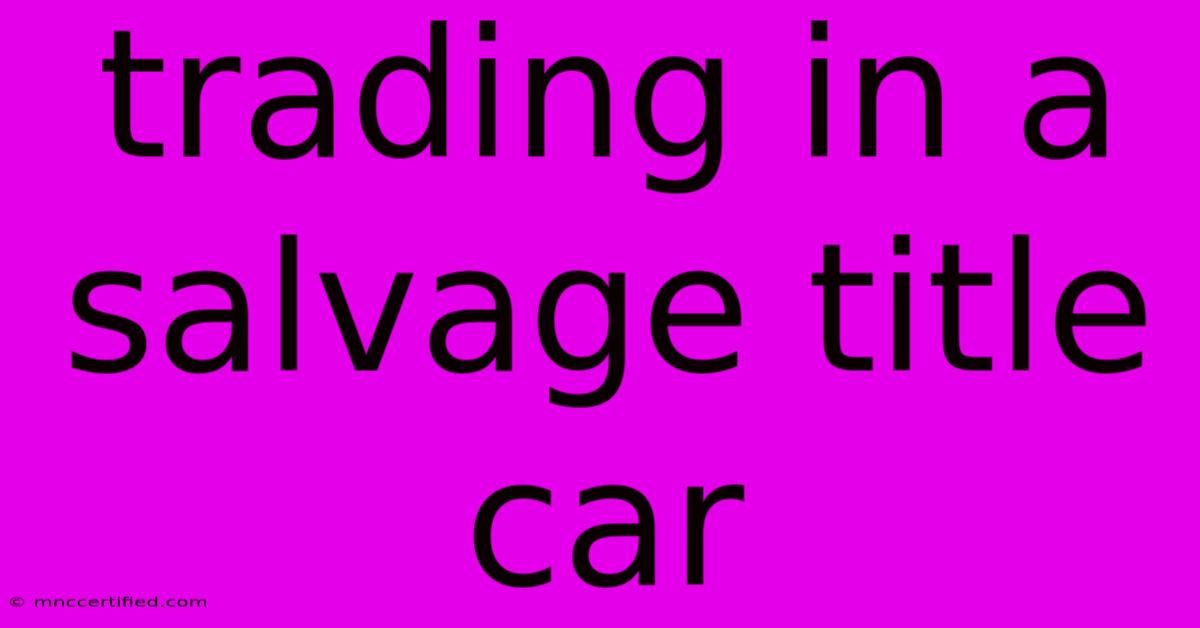Trading In A Salvage Title Car

Table of Contents
Trading in a Salvage Title Car: A Comprehensive Guide
Trading in a car is usually a straightforward process, but things get a bit more complicated when the vehicle in question has a salvage title. A salvage title indicates the car has been declared a total loss by an insurance company, usually due to significant damage from an accident or other event. This significantly impacts its resale value and the ability to trade it in. This guide will walk you through the process, highlighting the challenges and potential strategies for success.
Understanding Salvage Titles and Their Implications
Before attempting to trade in a salvage-titled car, it's crucial to understand what it means. A salvage title doesn't automatically mean the car is a junkyard candidate. Many vehicles with salvage titles are repairable and roadworthy, but they carry a stigma that affects their value. Key implications include:
- Lower Resale Value: Expect a significantly lower trade-in value compared to a clean title vehicle of the same make, model, and year. The depreciation can be substantial, sometimes as much as 50% or more.
- Limited Buyer Pool: Fewer dealerships and private buyers are willing to accept salvage-titled cars. This restricts your options and bargaining power.
- Disclosure Requirements: Dealerships are legally obligated to disclose the salvage title to potential buyers of the trade-in vehicle.
- Insurance Challenges: Securing comprehensive insurance for a salvage-titled car can be difficult and expensive, if possible at all. Some insurance companies may not cover such vehicles.
Preparing Your Salvage Title Car for Trade-In
Even with a salvage title, you can improve your chances of a successful trade-in by taking these steps:
- Complete Repairs: Thorough, professional repairs are essential. Make sure all necessary repairs are documented and ideally, inspected by a qualified mechanic. Providing this documentation to the dealership can boost your credibility.
- Professional Inspection: An independent mechanic's inspection report highlighting the completed repairs and the car's current roadworthiness adds significant weight to your case. This shows potential buyers the vehicle is safe and reliable.
- Gather Documentation: Collect all relevant paperwork, including the salvage title, repair bills, and the mechanic's inspection report. A well-organized package demonstrates transparency and professionalism.
- Clean Thoroughly: A clean and well-maintained car is more appealing, regardless of the title. Detailing is a worthwhile investment.
Finding Dealerships Willing to Accept Salvage Titles
Not all dealerships will accept salvage-titled cars. Your search might require more effort. Consider these options:
- Specialty Dealers: Some dealerships specialize in used cars, including those with salvage titles. They might be more willing to consider your trade-in.
- Independent Dealers: Independent dealerships are often more flexible than large franchise dealerships and might offer a better deal.
- Online Marketplaces: While selling privately is an option, using online marketplaces can allow you to expand your search for a dealership willing to work with a salvage title.
Negotiating the Trade-In Value
Negotiating the trade-in value of a salvage-titled car requires a strategic approach:
- Research Comparable Vehicles: Research the market value of similar vehicles with clean titles and salvage titles to establish a realistic expectation.
- Highlight the Repairs: Emphasize the quality and extent of the repairs made, backing your claims with documentation.
- Be Prepared to Negotiate: Expect a lower offer than you might receive for a clean title car, and be prepared to negotiate firmly but fairly.
- Consider a Lower Trade-In Value: Accepting a lower trade-in value might be necessary to secure a deal. Focus on the overall transaction, rather than just the trade-in.
Alternatives to Trading In
If trading in proves too difficult, consider alternative options:
- Private Sale: Selling privately allows you to potentially set a higher price, but it requires more effort and carries more risk.
- Parting Out: If the car is severely damaged, selling parts individually could be more profitable.
Conclusion: Navigating the Salvage Title Trade-In
Trading in a salvage title car presents unique challenges, but with careful preparation and a strategic approach, it's possible to achieve a successful outcome. By understanding the implications of a salvage title, completing necessary repairs, and finding the right dealership, you can significantly increase your chances of a favorable trade-in deal. Remember to always be transparent and upfront about the car's history and condition.

Thank you for visiting our website wich cover about Trading In A Salvage Title Car. We hope the information provided has been useful to you. Feel free to contact us if you have any questions or need further assistance. See you next time and dont miss to bookmark.
Featured Posts
-
Met Eireann Issues Fog Warning Midlands
Nov 28, 2024
-
Lala Andy Ariana On Vpr Switch Up
Nov 28, 2024
-
Vanderpump Rules Cast Cuts
Nov 28, 2024
-
Chicago Trading Company Salary
Nov 28, 2024
-
Bcw Tall Trading Card Dividers
Nov 28, 2024